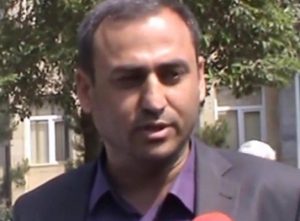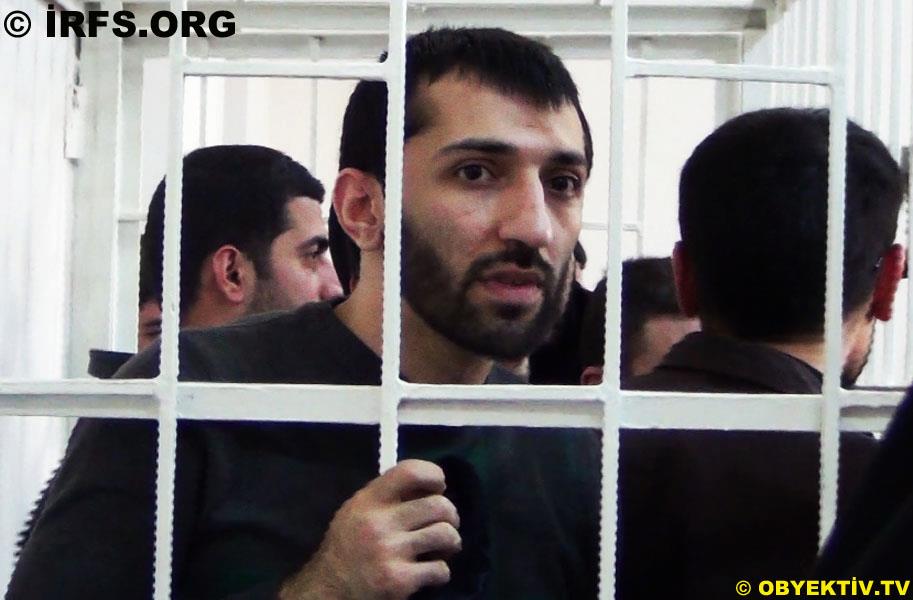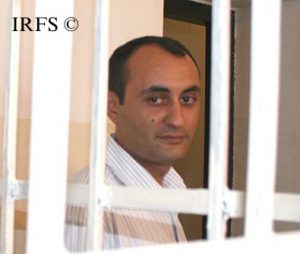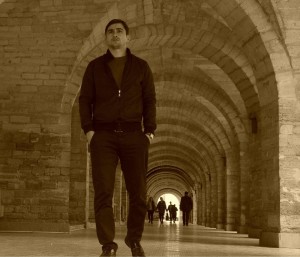23 Jul 2018 | Global Journalist, Mapping Media Freedom, Media Freedom, News and features
[vc_row][vc_column][vc_column_text]
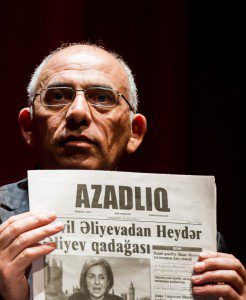
Rahim Haciyev, then acting editor-in-chief of Azerbaijani newspaper Azadliq in accpting the Index on Censorship Freedom of Expression Journalism Award in 2014 (Photo: Alex Brenner for Index on Censorship)
On the night that Rahim Haciyev accepted the Index on Censorship Freedom of Expression Guardian Journalism Award, he held aloft a copy of the paper that persevered despite assaults from the government whose misdoings it exposed. It was March 2014 and Haciyev, acting editor-in-chief of independent Azerbaijani newspaper Azadliq, was on stage in London. Triumphantly, he declared: “The newspaper team is determined to continue this sacred job – serving the truth. Because this is the meaning of what we do and the meaning of our lives.”
Four months later, this mission was compromised by threats, arrests and financial constraints for reporting on government corruption. It was not the first time Azadliq experienced economic pressure from its government-backed distributors under Azerbaijan’s now four-term leader, Ilham Aliyev. Aliyev has long faced accusations of authoritarian rule and suppressing dissent since taking office in 2003.
But months of fines surpassing £50,000 and mounting arrests overwhelmed the paper, which suspended its print edition in July 2014. Among other members of civil society and the independent media, Haciyev’s colleague, columnist Seymur Hezi, remains imprisoned for “aggravated hooliganism” after defending himself from a physical assault. The public’s widespread protest went unheard by the government.
As of this year, Reporters Without Borders’ Press Freedom Index has documented that 165 journalists are currently imprisoned in Azerbaijan. Monthly, the Mapping Media Freedom database features reports on the former Soviet republic’s assault on dissenting speech. In July 2018 alone, MMF documented four opposition websites blocked by the government for spreading misinformation, two editors of independent news outlets questioned by authorities and one journalist arrested for disobeying the police.
In December 2017 a high court in Azerbaijan upheld the blockage of five independent media organisations’ websites, including Azadliq.info, active since March 2017. Haciyev criticised this move as further inhibiting the Azerbaijani people’s ability to access objective information.
Living in exile in western Europe since 2017, he told Index: “Four employees of our site are in prison. Our employees who are in prison were accused of hooliganism and illegal financial transactions. All of them were arrested on trumped-up charges. All the charges were fabricated.”
Haciyev oversees the paper’s Facebook page from abroad, while the website remains updated and accessible to readers outside Azerbaijan. Regarding the current status of free expression back home, he said: “The situation in the country is very difficult. The authorities continue to oppress democratically minded people. Arrests of political activists and journalists continue.”
Haciyev spoke with Index’s Shreya Parjan about the ongoing situation.
Index: Is Azadliq alone as a target? Why was the publication perceived as such a threat to the government?
Hajiyev: We can not say that only Azadliq was subjected to repression. Azerbaijani authorities are very corrupt and cannot tolerate criticism from their opponents. The corrupt and repressive regimes around the world suppress freedom of speech. In this regard, the Azerbaijani authorities, especially in recent years, have been in the ranks of the world’s most repressive.
Index: What ultimately made you decide to leave Azerbaijan and how difficult was the process?
Hajiyev: The newspaper ceased its operations in September 2012. The authorities have not allowed Azadliq to be published. At that time, they left the site of the newspaper. I stayed in the country for some time. I regret that I had to leave the country after the very strong pressure of the authorities. My colleague continued to lead the website and the Facebook page of the newspaper. Of course it is a difficult process. To be forced to leave the country [is a] very unpleasant affair. I had to endure a lot of trouble. Nevertheless, I continued the business.
Index: While in exile, how have you been able to continue your work and advocate for change?
Hajiyev: At this time in exile, I continue to guide the website and the Facebook page of the newspaper. Being outside the country, I actively use social networking. On the one hand, I gather information, on the other hand, I distribute it. Social networks help organise and conduct work. Our Facebook page is one of the most popular in the country, and I am proud of our achievement.
Index: Could you identify any supportive communities you have encountered with while in exile? What obligation do foreign journalists have to collaborate and support one another in times of crisis?
Hajiyev: Communication between journalists who are abroad is important. To share experiences and information would be useful. It would be very nice to be able to communicate work by local journalists.
Index: How does the crackdown on digital freedom oppose the government narrative of a modern, free Azerbaijan?
Hajiyev: In Azerbaijan, there is a political regime that strongly suppresses freedom of speech. According to the index of freedom of speech, composed Reporters Without Borders, Azerbaijan occupies the 163rd place. Azerbaijan is currently undergoing one of the most difficult times in its history. The rights and freedoms of citizens have long been of nominal character. There are now more than 160 political prisoners.[/vc_column_text][/vc_column][/vc_row][vc_row full_width=”stretch_row_content”][vc_column][three_column_post title=”Global Journalist / Project Exile” full_width_heading=”true” category_id=”22142″][/vc_column][/vc_row]
22 Oct 2018 | Azerbaijan, Azerbaijan News, News and features
[vc_row][vc_column][vc_column_text]
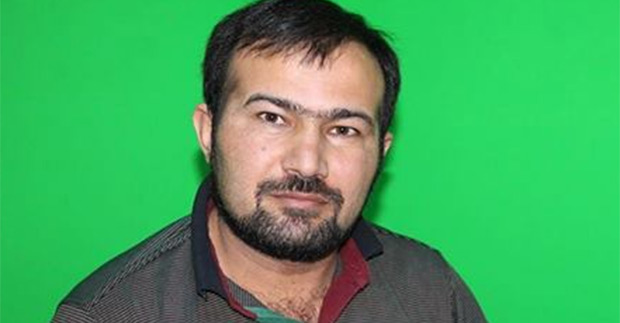
Journalist Seymur Hezi was arrested in August 2014. He was subsequently convicted of aggravated hooliganism and sentenced to five years in prison.
The editors of the Index on Censorship Freedom of Expression Award-winning newspaper Azadliq have launched a letter-writing campaign to journalist Seymur Hezi, who is in prison.
The letters will be printed out and sent to Penitentiary No. 17 where Hezi is detained.
Rahim Haciyev, acting editor of Azadliq newspaper, said Hezi’s health is suffering due to the prison conditions but he continues to write about the country’s recent political history.
Hezi was sentenced five years in prison in 2015 for “aggravated hooliganism”, according to Azadlıq Radiosu.
He was previously charged with disorderly conduct in 2014 after an altercation where the journalist defended himself from a physical assault and harassment, according to his lawyers.
The reason for Hezi’s imprisonment is seen as politically influenced due to his public activities. Haciyev said Hezi published critical articles of the authorities in the newspaper, along with critiques in his online TV broadcast “Azerbaijani Hour”.
The journalist’s family and lawyers say that his sentencing was politically motivated and biased. [/vc_column_text][vc_cta h2=”Take Action” color=”pink”]
[/vc_cta][vc_basic_grid post_type=”post” max_items=”12″ style=”load-more” items_per_page=”4″ element_width=”6″ grid_id=”vc_gid:1540207662388-f8c2a9c0-3f00-3″ taxonomies=”115″][/vc_column][/vc_row]
19 Oct 2018 | Global Journalist (Spanish), Journalism Toolbox Spanish, Spain
[vc_row][vc_column][vc_column_text]

Rahim Haciyev, el entonces editor jefe del periódico azerbaiyano Azadliq, aceptando el
Premio a la Libertad de Expresión en el Periodismo de Index on Censorship en 2014 (Foto: Alex Brenner para Index on Censorship)
[/vc_column_text][vc_custom_heading text=”“Es importante que los periodistas que se encuentran en el extranjero se comuniquen entre ellos“”][/vc_column][/vc_row][vc_row][vc_column][vc_column_text]
La noche que Rahim Haciyev aceptó el Premio a la Libertad de Expresión en el Periodismo de Index on Censorship, sostuvo en alto un ejemplar del periódico que perseveró pese a las agresiones del Gobierno cuyas fechorías sacaba a la luz. Corría marzo de 2014, y Haciyev, editor jefe en funciones del periódico independiente azerbaiyano Azadliq, estaba sobre un escenario de Londres. Triunfante, declaró: “El equipo de redacción está decidido a continuar este trabajo sagrado: servir a la verdad. Porque ese es el sentido de lo que hacemos y el sentido de nuestras vidas”.
Cuatro meses más tarde, esta misión se veía comprometida por amenazas, arrestos y restricciones económicas a causa de su labor informativa sobre la corrupción del Gobierno. No era la primera vez que Azadliq sufría presiones económicas por parte de sus distribuidores, respaldados por el Gobierno del ya cuatro veces reelegido líder de Azerbaiyán, Ilham Aliyev. Aliyev lleva mucho tiempo enfrentándose a acusaciones de autoritarismo y supresión de todo signo de disidencia desde que asumió el cargo en 2003.
Pero los meses de multas que ascendían a casi 57.000 euros y los arrestos en aumento acabaron por aplastar al periódico, que suspendió su edición impresa en julio de 2014. El columnista Seymur Hezi, compañero de Haciyev, permanece en prisión—por “vandalismo grave” tras defenderse de una agresión—, al igual que tantos otros miembros de la sociedad civil y los medios independientes. El Gobierno ignoró las protestas sociales generalizadas.
Hasta la fecha, el Índice de Libertad de Prensa de Reporteros sin Fronteras ha documentado 165 periodistas encarcelados actualmente en Azerbaiyán. La base de datos de Mapping Media Freedom (MMF) informa cada mes sobre el acoso que ejerce la exrepública soviética sobre toda expresión de discrepancia. Solo en julio de 2018, MMF documentó el bloqueo por el Gobierno de cuatro páginas de la oposición por diseminar falsa información, el interrogatorio a manos de las autoridades de dos editores de informativos independientes y el arresto de un periodista por desobedecer a la policía.
En diciembre de 2017, un tribunal supremo de Azerbaiyán confirmó el bloqueo de las páginas de cinco organizaciones independientes de comunicación, incluida Azadliq.info, en activo desde marzo de 2017. Haciyev criticó la medida por suponer una limitación más para el pueblo azerbaiyano a la hora de acceder a información objetiva.
Desde su exilio en Europa occidental, iniciado en 2017, declaró para Index: “Cuatro empleados de nuestra web están en prisión, acusados de vandalismo y transacciones financieras ilegales. Los arrestaron a todos con cargos falsos. Todos esos cargos se los inventaron”.
Haciyev dirige la página de Facebook del periódico desde el extranjero, mientras la web se mantiene actualizada y accesible para los lectores de fuera de Azerbaiyán. Sobre el estado actual de la libertad de expresión en su país, dijo: “La situación en el país es muy complicada. Las autoridades siguen oprimiendo a la gente con mentalidad democrática. Los arrestos de activistas políticos y periodistas continúan”.
Haciyev habló con Shreya Parjan, de Index, sobre la situación actual.
Index: ¿Es Azadliq el único en el punto de mira? ¿Por qué consideran a la publicación una amenaza para el Gobierno?
Hajiyev: No podemos decir que Azadliq haya sido la única en sufrir represión. Las autoridades azerbaiyanas son muy corruptas y no toleran críticas de sus oponentes. Los regímenes corruptos y represivos del mundo sofocan la libertad de expresión. En este sentido, las autoridades azerbaiyanas, especialmente en los últimos años, se han situado en el ranking de las más represivas del mundo.
Index: ¿Qué es lo que te llevó a abandonar Azerbaiyán definitivamente? ¿Fue un proceso difícil?
Hajiyev: El periódico cesó su actividad en septiembre de 2012. Las autoridades no han permitido que se publique Azadliq. Aquella vez dejaron en paz la sede del periódico. Yo me quedé en el país un tiempo. Lamento haber tenido que dejar el país
por la fuerte presión de las autoridades. Mi compañero siguió dirigiendo la web y la página de Facebook del periódico. Por supuesto que es un proceso difícil. Verse obligado a dejar el país [es un] asunto muy desagradable. Tuve que vérmelas con muchos problemas. Sin embargo, continué trabajando.
Index: ¿Cómo has sido capaz de continuar tu trabajo y propugnar el cambio desde el exilio?
Hajiyev: Ahora mismo, aún en el exilio, sigo dirigiendo la web y la página de Facebook del periódico. Al no estar en el país, uso las redes sociales activamente. Por un lado, recabo información; por otro, la distribuyo. Las redes sociales ayudan a organizar el trabajo y llevarlo a cabo. Nuestra página de Facebook es una de las
más populares del país, y estoy orgulloso de nuestro logro.
Index: ¿Puedes nombrar alguna comunidad de apoyo que hayas conocido en el exilio? ¿Qué obligación tienen los periodistas extranjeros de colaborar y apoyarse mutuamente en tiempos de crisis?
Hajiyev: Es importante que los periodistas que se encuentran en el extranjero se comuniquen entre ellos. Sería útil compartir experiencias e información. Estaría muy bien
poder transmitir el trabajo de periodistas locales.
Index: ¿Cómo crees que la brutal campaña contra la libertad digital se contrapone a la narrativa del Gobierno de un Azerbaiyán moderno y libre?
Hajiyev: En Azerbaiyán hay un régimen político que reprime enérgicamente la libertad de expresión. Según el Índice de Libertad de Prensa de Reporteros sin Fronteras, Azerbaiyán ocupa el puesto 163. Ahora mismo el país está pasando por uno de los periodos más difíciles de su historia. Los derechos y libertades de la ciudadanía hace mucho que solo tienen valor nominal. Actualmente hay más de 160 prisioneros políticos.
[/vc_column_text][/vc_column][/vc_row]
29 Mar 2017 | Azerbaijan, Azerbaijan News, Digital Freedom, Mapping Media Freedom, News and features
[vc_row][vc_column][vc_column_text]

Rahim Haciyev, acting editor-in-chief of 2014 Index on Censorship Freedom of Expression Journalism Award-winning Azerbaijani newspaper Azadliq (Photo: Alex Brenner for Index on Censorship)
Civil, political and human rights are harshly restricted and frequently violated in Azerbaijan. Independent and critical journalists frequently find themselves — or their families — targeted.
Rahim Haciyev, acting editor in chief of the Index Award-winning independent newspaper Azadliq, was forced to flee Azerbaijan after years of official harassment. The government has repeatedly cracked-down on dissent.
Haciyev wrote to Index on Censorship from exile in a western European country:
I’m very sorry that the repressive policy of the Azerbaijani authorities against the Azadliq newspaper forced me to leave the country.
After the arrest of the newspaper’s financial director Faig Amirli, the authorities soon stopped issuing a print version. Amirli was arrested on obviously fabricated charges. I was summoned several times to the prosecutor’s office several times to testify about the paper’s financial affairs. The prosecutors said that this was connected with the criminal case of Amirli, but are invesitgating him under charges of “inciting religious hatred” and “violating the rights of citizens under the pretext of conducting religious rights”.
It turned out that they were interested in the financial issues of the newspaper in order to find a way to silence it. In addition, several employees of the newspaper were summoned for questioning. Then a court ordered tax authorities to comb through the paper’s financial activities. It’s clear that this was undertaken to increase pressure on the newspaper and me personally.
Aiming to cripple Azadliq, the government-owned distribution company was ordered to withhold circulation receipts — $84,000. So we weren’t able to print or even pay our bills. Three staffers are in prison — Seymur Hezi, Faig Amirli and Elchin. Each of them had sharply criticised the lawlessness and corruption of Azerbaijani officials.
In February, 11 Azadliq employees were summoned to the prosecutor’s offices to be interrogated again. Several government agencies increased their pressure on the newspaper’s online operation.
I had been warned twice in the past two years by the prosecutor general’s office that under my leadership Azadliq had been slandering Azerbaijani authorities. In their notices I was told that failure to comply with their terms would mean legal repercussions for me. But I refused. The newspaper continued to report on corruption, abuses of power and the absence of the rule of law. We were devoted to pursuing the truth.
And that is why the authorities intensified repression against the newspaper. Now this lawlessness has forced me to leave the country.
This decision was extremely difficult. I am cut off from my family and friends. I have two children and don’t know when I will see them again.
But despite all the problems I will continue to work daily for the newspaper’s website.
It’s my job, this is my job, this is my life.
Rahim Haciyev
Acting Editor-in-Chief, Azadliq
Haciyev is just one of the many journalists who have been targeted by Azerbaijani authorities in recent years. The country is ranked 163rd out of 180 countries in RSF’s 2016 World Press Freedom Index, which ranks 180 countries according to the level of freedom available to journalists. Almost everyone who speaks out against the regime of President Ilham Aliyev, including journalists, human rights defenders, activists and bloggers, are commonly imprisoned on spurious charges, such as drug and weapon possession, hooliganism and tax evasion. Reports of torture and abuse are typical by those being detained. At least 15 Azerbaijani prisoners of conscience currently remain in jail, including:[/vc_column_text][/vc_column][/vc_row][vc_row][vc_column width=”1/2″][vc_column_text]

Mehman Huseynov (Twitter)
Mehman Huseynov, an Azerbaijani journalist and pro-opposition blogger, was sentenced to two years in jail on 3 March by a Baku court for defaming the police chief of the city’s Nasimi district. Huseynov intends to appeal his sentencing. According to Front Line Defenders, a group of police officers violently attacked Huseynov on 9 January. The next he was brought to court, found guilty of disobeying police orders and fined 200 manat (£96). [/vc_column_text][/vc_column][vc_column width=”1/2″][vc_column_text]
Founder and editor of online news portal Kend.info Elchin Ismayilli was arrested on 17 February on charges of “extorting money” and “aggravated abuse of a position of influence”. According to the Caucasian Knot, he was also accused of blackmailing a local office, charges he insists were fabricated to silence his coverage of local corruption and human rights violations. On 18 February, Ismayilli was sentenced to a pre-trial detention period of 24 days. He has previously been subject to multiple arrests and cases of harassment related to his work as a journalist.[/vc_column_text][/vc_column][/vc_row][vc_row][vc_column width=”1/2″][vc_column_text]
On 3 March, a court decided to prolong the period of investigation of Faig Amirli for three months, the Azerbaijan Press Agency reported. Amirli, financial director of newspaper and assistant chairman of the Azerbaijani Popular Front Party (APFP), was arrested on 20 August 2016 for “inciting religious hatred” and “violating the rights of citizens under the pretext of conducting religious rights,” according to Radio Free Europe/Radio Liberty.[/vc_column_text][/vc_column][vc_column width=”1/2″][vc_column_text]
Writer and blogger Rashad Ramazanov was arrested on 9 May 2013 and sentenced to nine years in prison. According to English PEN, his charges included “illegal possession and sale of drugs”. Police claimed to have found nine grams of heroin on his body, although Ramazanov insists that the drugs were planted by the officers, who he claims also beat him up and tortured him during interrogation. Ramazanov was sentenced to nine years in prison in November 2013 on a trumped-up drug trafficking charge. PEN International reported that on 23 January Ramazanov was moved to solitary confinement for 15 days, the reason for which remains unknown. On 7 February Ramazanov was released from solitary confinement, and his family was given permission to visit him.[/vc_column_text][/vc_column][/vc_row][vc_row][vc_column width=”1/2″][vc_column_text]
Founder and editor of the website Azel, Afgan Sadygov, was sentenced on 12 January to 2.5 years in jail. Sadygov was arrested on 22 November 2016 based on accusations of “hooliganism” after he was attacked on 9 August 2016 and allegedly hit a woman, Contact Online news reported. Sadygov’s website often reports on issues such as poor infrastructure maintenance, bad quality of roads and waste of public funds in Azerbaijan’s Jalilabad region.[/vc_column_text][/vc_column][vc_column width=”1/2″][vc_column_text]

Seymur Hezi
According to MeydanTV, the Supreme Court will hear the appeal of Seymur Hezi, reporter for opposition news source Azadliq and presenter for critical TV program “Azerbaycan Saati” on 13 April. The journalist was sentenced to five years in prison on 29 January 2015 on a trumped-up charge of aggravated hooliganism, Index on Censorship reported. The charge came after Hezi was attacked on 29 August by Maherram Hasanov, a complete stranger, and defended himself. Hezi has accused President Ilham Aliyev and chief of staff Ramiz Mehdyev of ordering his arrest.[/vc_column_text][/vc_column][/vc_row][vc_row][vc_column width=”1/2″][vc_column_text]
The lawyer of Nijat Aliyev, former chief editor of religious website Azadxeber.org, has not been able to get hold of the text of the verdict of the Supreme Court of Azerbaijan for his client, Contact Online news reported. Aliyev’s lawyer believes that the delay has been intentional in order to prevent the filing of a complaint with the European Court of Human Rights, Contact Online news reported. According to IRFS, Aliyev was detained on 20 May 2012 and sentenced to 10 years in prison on 9 December 2013 on charges of illegal possession of drugs and weapons, incitement of religious hatred, calls to seize power and distributing banned religious literature. Aliyev’s website previously published criticisms of the government’s policies in regards to religion, the possibility of a LGBT parade in Baku and the allotment of too much funding for the Eurovision Song Contest in 2012, OCCRP reported.[/vc_column_text][/vc_column][vc_column width=”1/2″][vc_column_text]
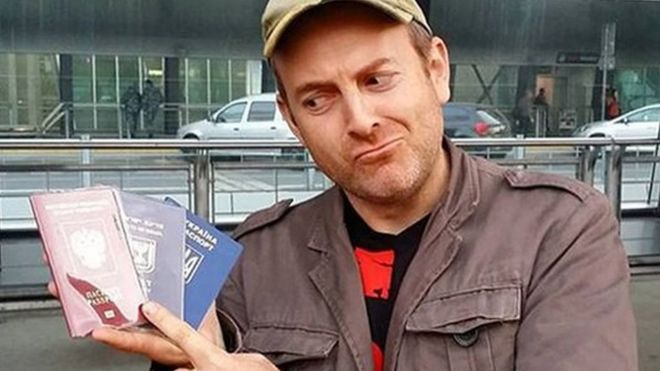
Alexander Lapshin (BBC)
Russian-Israeli travel blogger Alexander Lapshin was extradited from Belarus to Azerbaijan on 7 February. He faces up to five years in prison on charges of “public calls against the state” and “unauthorised crossing of borders,” according to Armenian News Agency ArmenPress. These charges came after Lapshin traveled to the disputed territory of Nagorno-Karabakh and sympathised in his blog entries with the Armenians he met, GlobalResearch reported. [/vc_column_text][/vc_column][/vc_row][vc_row][vc_column width=”1/2″][vc_column_text]
Fikrat Faramazoglu, editor-in-chief of news website jam.az, has been detained since 30 June 2016 on the charge of extortion by means of threats, which is punishable by up to five years in prison. According to Azerbaijan Free Expression Platform, these charges originated when a local restaurant owner accused Faramazoglu of extorting money from him when asked to remove defamatory articles about the restaurant on websites owned by the journalist.[/vc_column_text][/vc_column][vc_column width=”1/2″][vc_column_text]
Blogger and social media activist Abdul Abilov has been imprisoned since 22 November 2013. According to Azerbaijan Free Expression Platform, Abilov was charged with illegal possession, storage and manufacturing or sale of drugs when authorities claim to have found illegal drugs in his home and on his person, which Abilov continues to protest were planted on him. On 27 May 2014 Abilov was sentenced to five-and-a-half years in prison. Stop Sycophants!, the Facebook page previously run by Abilov, was shut down following his arrest, IRFS reported. The page was known to strongly criticise authorities.[/vc_column_text][/vc_column][/vc_row]








